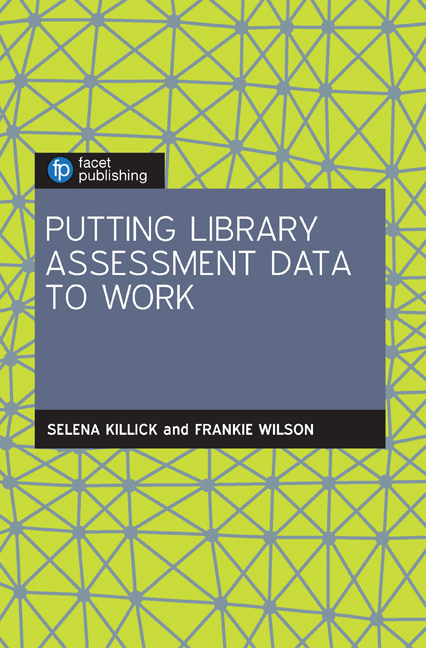Book contents
- Frontmatter
- Dedication
- Contents
- List of figures and tables
- List of case studies
- Authors and contributors
- Acknowledgements
- 1 Introduction to Library Assessment
- 2 Institutional Measures of Student Satisfaction
- 3 Standardised Library Surveys
- 4 In-House Library Surveys
- 5 Library Statistics
- 6 Qualitative Feedback
- 7 Emerging Techniques
- 8 More than Measuring: using Assessment Holistically
- 9 Conclusions
- Index
5 - Library Statistics
Published online by Cambridge University Press: 02 October 2019
- Frontmatter
- Dedication
- Contents
- List of figures and tables
- List of case studies
- Authors and contributors
- Acknowledgements
- 1 Introduction to Library Assessment
- 2 Institutional Measures of Student Satisfaction
- 3 Standardised Library Surveys
- 4 In-House Library Surveys
- 5 Library Statistics
- 6 Qualitative Feedback
- 7 Emerging Techniques
- 8 More than Measuring: using Assessment Holistically
- 9 Conclusions
- Index
Summary
Chapter overview
There are two types of librarians, those who love statistics and those whose eyes glaze over at the sight of a spreadsheet. If you've made it to Chapter 5 of this text the chances are you fit into the former category. Libraries have a long history of data collection. Early records show that the Bodleian Library at the University of Oxford was collecting data on the number of readers in the 18th century (Thompson, 1951). Nowadays libraries collect a vast amount of data for a variety of purposes. In this chapter we explore some of these data sets and how they are used to improve the library service.
The following case studies are presented in this chapter:
• Case Study 5.1 Keeping purposeful intelligence: a case study from Learning Services at Edge Hill University (Helen Jamieson, Edge Hill University)
• Case Study 5.2 Assessing subject access in special collections at Harvard University (Emilie Hardman, Massachusetts Institute of Technology and Susan Pyzynski, Harvard University).
The wealth of data available frequently requires a library to develop and maintain a data inventory. In Case Study 5.1 Jamieson shows how various library data sets collected in the library can be used. The Management Information and Data Solutions (MIDAS) project team at Edge Hill University has worked with library staff to develop and understand data. By engaging stakeholders and building staff skills they have gone on to design key performance indicators (KPIs) which inform decision making and service planning, and advocate the service within the wider organisation and beyond.
In Case Study 5.2 by Hardman and Pyzynski we see how using library data to investigate the use of the special collections at Harvard University had an unexpected outcome. The initial research focused on using library analytics to identify which titles in the collection were most popular with customers. Staff wanted to evaluate which subject areas were consulted the most. Instead they found that items which did not have any subject-identifying metadata were used less than those with detailed records. Cataloguing practices in the past had focused only on recording item details, for example the title and author, but without subject headings.
- Type
- Chapter
- Information
- Putting Library Assessment Data to Work , pp. 83 - 98Publisher: FacetPrint publication year: 2019



